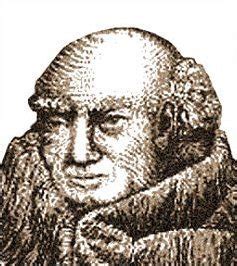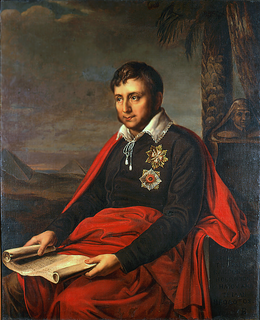A Quote by Marcus Tullius Cicero
A man does not wonder at what he sees frequently, even though he be ignorant of the reason. If anything happens which he has not seen before, he calls it a prodigy.
Related Quotes
Everything happens through immutable laws, ...everything is necessary... There are, some persons say, some events which are necessary and others which are not. It would be very comic that one part of the world was arranged, and the other were not; that one part of what happens had to happen and that another part of what happens did not have to happen. If one looks closely at it, one sees that the doctrine contrary to that of destiny is absurd; but there are many people destined to reason badly; others not to reason at all others to persecute those who reason.
Wonder [admiratio astonishment, marvel] is a kind of desire for knowledge. The situation arises when one sees an effect and does not know its cause, or when the cause of the particular effect is one that exceeds his power of understanding. Hence, wonder is a cause of pleasure insofar as there is annexed the hope of attaining understanding of that which one wants to know. ... For desire is especially aroused by the awareness of ignorance, and consequently a man takes the greatest pleasure in those things which he discovers for himself or learns from the ground up.
A man becomes spiritual insofar as he lives a spiritual life. He begins to see God in all things, to see His power and might in every manifestation. Always and everywhere he sees himself abiding in God and dependent on God for all things. But insofar as a man lives a bodily life, so much he does he do bodily things; He doesn't see God in anything, even in the the most wondrous manifestations of His Divine power. In all things he sees body, material, everywhere and always - "God is not before his eyes." (Ps. 35:2)
To instruct calls for energy, and to remain almost silent, but watchful and helpful, while students instruct themselves, calls for even greater energy. To see someone fall (which will teach him not to fall again) when a word from you would keep him on his feet but ignorant of an important danger, is one of the tasks of the teacher that calls for special energy, because holding in is more demanding than crying out.
For authority proceeds from true reason, but reason certainly does not proceed from authority. For every authority which is not upheld by true reason is seen to be weak, whereas true reason is kept firm and immutable by her own powers and does not require to be confirmed by the assent of any authority.
It is not science which leads to unbelief but rather ignorance. The ignorant man thinks he understands something provided that he sees it every day. The natural philosopher walks amid enigmas, always striving to understand and always half-understanding. He learns to believe what he does not understand, and that is a step on the road to faith.












































